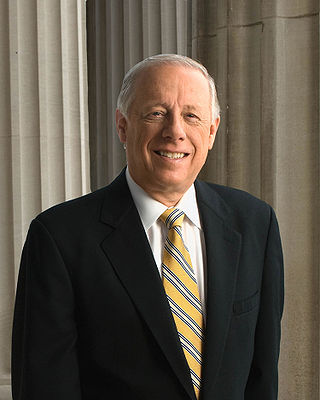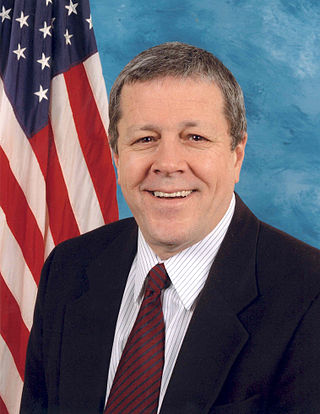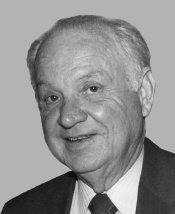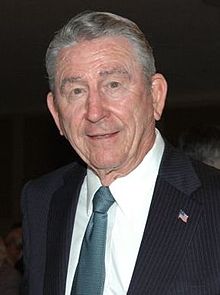
Andrew Lamar Alexander Jr. is an American politician and attorney who served as a United States Senator from Tennessee from 2003 to 2021. A member of the Republican Party, he also was the 45th governor of Tennessee from 1979 to 1987 and the 5th United States Secretary of Education from 1991 to 1993, where he helped the implementation of Education 2000.

Philip Norman Bredesen Jr. is an American politician and businessman who served as the 48th governor of Tennessee from 2003 to 2011. A member of the Democratic Party, he was elected in 2002 with 50.6% of the vote and re-elected in 2006 with 68.6%. He is the most recent Democrat elected to a statewide office in the state. He served as the 66th mayor of Nashville from 1991 to 1999. Bredesen is the founder of the HealthAmerica Corporation, which he sold in 1986.

Ned Ray McWherter was an American businessman and politician who served as the 46th Governor of Tennessee, from 1987 to 1995. Prior to that, he served as Speaker of the Tennessee House of Representatives from 1973 to 1987, the longest tenure as Speaker up to that time.

Donald Kenneth Sundquist was an American businessman and politician who served as the 47th governor of Tennessee from 1995 to 2003. Prior to his governorship, he represented Tennessee's 7th congressional district in the United States House of Representatives from 1983 to 1995. He was a member of the Republican Party.

Earl Buford Ellington was an American politician who served as the 42nd governor of Tennessee from 1959 to 1963, and again from 1967 to 1971. Along with his political ally, Frank G. Clement, he helped lead a political machine that controlled the governor's office for 18 years, from 1953 to 1971.

John Shelton Wilder was an American politician who was the 48th Lieutenant Governor of Tennessee for 36 years from January 1971 to January 2007, possibly the longest time anyone has served as Lieutenant Governor or a similar position in the history of the United States. He was a Tennessee state senator from 1959 to 1961 and again from 1967 to 2009. Tennesseans do not elect their lieutenant governor; rather, the Speaker of the Senate, who is first in the line of succession to the governor, is granted the title by statute.

John Sumners Tanner is a former American politician who served as the U.S. representative for Tennessee's 8th congressional district, serving from 1989 until 2011. He is a member of the Democratic Party. Since his retirement, Tanner has served as the Vice Chairman of Prime Policy Group.

James Henry Quillen was an American politician who served as a Republican member of the United States House of Representatives from Tennessee from 1963 to 1997. Quillen represented the 1st congressional district, which covers the northeast corner of the state, including the Tri-Cities region.

Thomas Clarke Rye was an American politician who served as the 32nd governor of Tennessee from 1915 to 1919. An ardent supporter of prohibition of alcoholic beverages, he helped reunify the state's Democratic Party, which had been divided over the issue for nearly a decade. Rye is perhaps best remembered for enacting the "Ouster Law," which was aimed at curbing the power of political boss E. H. Crump.

William Edward Haslam is an American billionaire businessman and politician who served as the 49th governor of Tennessee from 2011 to 2019. A member of the Republican Party, Haslam previously served as the 67th mayor of Knoxville, Tennessee.
The Tennessee Plan is a system used to appoint and elect appellate court judges in Tennessee. It is largely patterned after the Missouri Plan, and an earlier version in Tennessee was called the Modified Missouri Plan. At the end of every judge's eight-year term following a judicial appointment to the highest courts, retention elections are held, which have the option of whether each judge shall be retained through a yes-no option. This system applies to the Tennessee Supreme Court, the Tennessee Court of Appeals, and the Tennessee Court of Criminal Appeals.
Roy Herron was an American politician, attorney, and author. He was the Chairman of the Tennessee Democratic Party. He was the Tennessee State Senator for the 24th district for 16 years and for 10 years before that the State Representative for the 76th district. He was the 2010 Democratic nominee for U.S. Representative for Tennessee's 8th congressional district.

The James H. Quillen College of Medicine is a medical school and a part of East Tennessee State University, which is located in Johnson City, Tennessee. It is one of two public medical schools in Tennessee, the other being the University of Tennessee College of Medicine at the University of Tennessee Health Science Center in Memphis.

The 2010 United States House of Representatives elections in Tennessee was held on November 2, 2010, to elect the nine U.S. representatives from the state of Tennessee, one from each of the state's nine congressional districts.

The 2014 United States Senate election in Tennessee took place on November 4, 2014, to elect a member of the United States Senate from the State of Tennessee. Incumbent Republican U.S. Senator Lamar Alexander defeated Democrat Gordon Ball, and was re-elected to a third term in office with 61.9% of the vote against 31.9%.

The 2014 Tennessee gubernatorial election took place on November 4, 2014, to elect the governor of Tennessee. Incumbent Republican Governor Bill Haslam was re-elected to a second term with 70.3% of the vote, defeating his Democratic challenger Charles Brown. Improving on his performance from 2010, Haslam also carried every county in the state.

The 1988 United States presidential election in Tennessee took place on November 8, 1988. All 50 states and the District of Columbia were part of the 1988 United States presidential election. Tennessee voters chose 11 electors to the Electoral College, which selected the president and vice president. Tennessee was won by incumbent United States Vice President George H. W. Bush of Texas, who was running against Massachusetts Governor Michael Dukakis. Bush ran with Indiana Senator Dan Quayle as Vice President, and Dukakis ran with Texas Senator Lloyd Bentsen.

The 1986 Tennessee gubernatorial election was held on November 4, 1986, to elect the next governor of Tennessee. Democratic nominee Ned McWherter defeated former Republican Governor Winfield Dunn with 54.3% of the vote.

The 1970 Tennessee gubernatorial election was held on November 3, 1970, to elect the next governor of Tennessee. Incumbent Democratic Governor Buford Ellington was term-limited and was prohibited by the Constitution of Tennessee from seeking another term. Republican nominee Winfield Dunn, defeated Democratic opponent John Jay Hooker with 52.0% of the vote.

The 2022 Tennessee gubernatorial election took place on November 8, 2022, to elect the governor of Tennessee. Incumbent Republican Governor Bill Lee was re-elected to a second term with 64.9% of the vote, defeating his Democratic challenger Jason Martin. Lee improved on his performance from 2018.

















